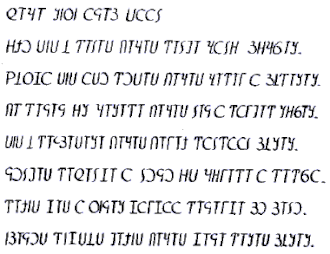Gadabuursi Somali Script
| Borama | |
|---|---|
 | |
| Script type | |
| Languages | Somali language |
The Gadabuursi script, also known as the Borama script (Borama: ![]() ),[1] is an alphabetic script for the Somali language. It was devised around 1933 by Sheikh Abdurahman Sheikh Nuur of the Gadabuursi clan.[2]
),[1] is an alphabetic script for the Somali language. It was devised around 1933 by Sheikh Abdurahman Sheikh Nuur of the Gadabuursi clan.[2]
History
[edit]
Though not as widely known as Osmanya, the other major orthography for transcribing Somali, Borama has produced a notable body of literature mainly consisting of qasidas.[3]
The Borama or Gadabuursi Script was devised in 1933 by Sheikh Abdurahman Sheikh Nuur, a Qur'anic teacher and son of Borama's qadi (judge), who devised the new orthography for transcribing the Afro-Asiatic Cushitic Somali language. A quite accurate phonetic writing system, it was principally used by Sheikh Nuur, his circle of associates in the city and some of the merchants in control of trade in Zeila and Borama. Students of Sheikh Nuur were also trained in the use of this alphabet.[2]
See also
[edit]References
[edit]- ^ Somali alphabets, pronunciation and language at Omniglot
- ^ a b Laitin, David D. (1 May 1977). Politics, Language, and Thought: The Somali Experience. University of Chicago Press. pp. 98–. ISBN 978-0-226-46791-7. Retrieved 2 July 2012.
- ^ Lewis, I.M. (1958). "The Gadabuursi Somali Script". Bulletin of the School of Oriental and African Studies. 21. University of London: 134–156. doi:10.1017/S0041977X00063278. S2CID 161856327.
External links
[edit]- 'Borama/Gadabuursi alphabet' in Somali, at Omniglot
- Tosco, Mauro (University of Turin) (2010). "Somali Writings". Afrikanistik-Aegyptologie-Online. Retrieved 2023-04-07. [Covers Wadaad's writing, Osmanya, Gadabuursi, and Kaddare.]
- Somali reconstruction and Local Initiative: Amoud University. Published in World Development (2001).
- The Gadabuursi Somali Script - qasidas in Gadabuursi/Borama
- The report of the Somali Language Committee
